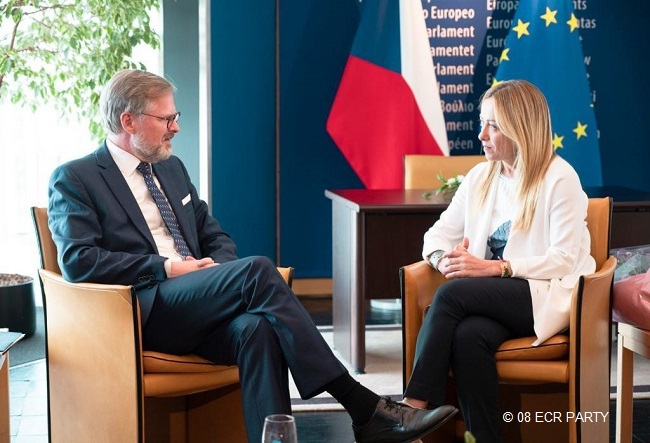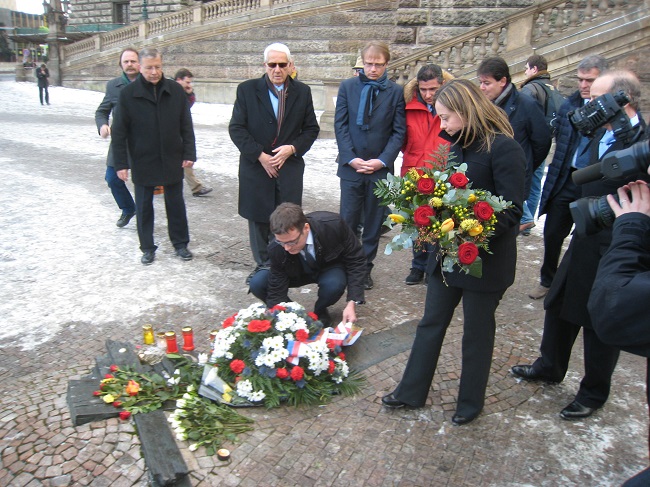From ‘rising star of the European right, heir of Margaret Thatcher’, to ‘neo-fascist, allied with a Putin puppet like Salvini and a mafioso like Berlusconi’. How Czech politics welcomed the electoral victory of the leader of Fratelli d’Italia, whose trip to Prague in 2009 to commemorate the 40th anniversary of Jan Palach’s sacrifice is recalled
The Italian elections on Sunday 25 September and the now almost certain obtainment of an absolute majority in the Chamber of Deputies and the Senate by the centre-right coalition, led by Giorgia Meloni’s party Fratelli d’Italia (FdI), were also followed with curiosity in the Czech Republic. Some local politicians and leading newspapers have tried to speculate on the impact and consequences of this new political alliance not only in the Peninsula but in the entire European Union. Inevitably, there have also been references to the frequently displayed proximity of the Italian centre-right formation to the governments of Hungary and Poland, as well as to the sympathies shown in the past by the centre-right exponents towards Vladimir Putin’s Russia.
The first to react to Giorgia Meloni’s victory was the Czech Prime Minister, the Civic Democrat (ODS) Petr Fiala, who expressed his congratulations using warm words: ‘I look forward,’ he wrote on Twitter, ‘to working together in the future in European politics and within the ECR group. The ECR is the group of European Conservatives and Reformists in the European Parliament of which ODS and FdI are members and of which Meloni was elected president in 2020, succeeding, incidentally, the Czech MEP, Jan Zahradil, who had been in office for 11 years.
Moreover, it was Meloni herself, in November last year, when Fiala was appointed Prime Minister, who immediately congratulated him with these words: ‘The ODS party of the Czech Republic is a historical member of our conservative ECR family, defending national values under the banner of Eurorealism and positive cooperation with the other nations belonging to the Visegrad group. From Prague, once again, a wind of freedom blows, and I am convinced that with Petr Fiala we will strengthen at the European level the perspective of a governing Right and a centre-right strongly opposing the Left’.
The tenderness, politically speaking, between Meloni and Fiala was also clear last March when the FdI leader openly praised the Czech prime minister when the latter, together with the Pole Mateusz Morawiecki and the Slovenian Janez Jansa, travelled by train to Kiev while Ukraine was under Russian attack. “Three right-wing prime ministers made a historic gesture of immense courage to express their solidarity with the Ukrainian people. If the whole EU had this kind of rulers, we would live in a better and safer Europe,’ were the words of the Italian right-wing leader.
Enthusiastic opinions, but also not
It was precisely the Russian invasion of Ukraine that has prompted Meloni to don an unequivocally Atlanticist guise this year, after she and her party had previously campaigned against sanctions (‘in favour of Made in Italy and Italian interests’) and in favour of the Sputnik vaccine during the pandemic, which was obviously much appreciated by Moscow and the Kremlin strongman.
“I personally do not remember a single instance of discord with Fratelli d’Italia during the whole period of the war in Ukraine,” Czech MEP Alexandr Vondra, also a member of ODS, pointed out on the topic, appearing now willing to swear on Meloni and Fratelli d’Italia’s western loyalty.
“I have no doubt that Giorgia Meloni and her party are on the side of the West. I also say this on the basis of my experience with their MEPs, whom I know well. They are not Putin’s agents, let’s not talk nonsense. On the contrary, they are very pro-Atlantic and pro-NATO,” he said in an interview with Denik. The opinion is certainly relevant as Vondra, a former dissident and signatory of Charter 77, later Vaclav Havel’s foreign policy advisor, as well as ambassador to Washington and Minister of Foreign Affairs and Defence, has always taken clearly pro-Atlantic positions and is generally regarded as a post-1989 guarantor of Prague’s loyalty to Washington.
Vondra himself bluntly rejected the ‘post-fascist party’ label generally attributed to Fratelli d’Italia. ‘This is the nonsense that appears from time to time in the left-wing press in Western Europe. From my point of view, FdI is a normal conservative party in Western Europe. Meloni is very much influenced by Anglo-Saxon style and ideology. She is close to British conservatives and hearing her speak and articulate clear and rich ideas has made me think of Margaret Thatcher on various occasions’.
It has to be said that Meloni’s juxtaposition to Thatcher on the political spectrum, repeated by Vondra on Twitter, provoked a number of critical reactions and even a few sarcastic comments. Pro-EU activist David Antoš, for example, joked: ‘It’s true, Meloni is basically Thatcher’s twin sister. Many people don’t know it, but Thatcher was always a great admirer of Mussolini, whom she called the best Italian politician of the 20th century. And she never forgave Churchill for behaving like that with Mussolini…’.
Jan Zahradil, another Czech MEP from the Civic Democratic Party, Meloni’s predecessor to the presidency of the European Conservatives and Reformists in the EU Parliament, is also enthusiastic about the Italian election result. “This is something big, something historic. Italy will have a female prime minister for the first time, and from the right-wing conservative camp. It is a victory that represents a fundamental turning point not only for Italy but also for the EU, which will serve to revive the stagnant waters of European politics,’ said Zahradil, who highlighted ‘the nervousness of the Brussels establishment and the hysterical alarm raised by the pro-EU media against Meloni’.
The satisfaction expressed by the Civic Democrats for Meloni’s victory was on the other hand, criticised by the Pirates, ODS’s government allies. The harshest stance was taken by MEP Marcel Kolaja, who is also vice-president of the party. Addressing PM Fiala, he posted on Twitter: ‘I understand that, as Prime Minister, congratulations are in order. But it seems out of place to say you are eager to collaborate with neo-fascists, who have formed an alliance with a lackey of Putin and that mafioso Berlusconi’. He also attached an old video in which a little more than teenage Meloni told a French TV station: ‘Benito Mussolini was a good politician because everything he did, he did for Italy’.
Appearing to be critical, albeit in a more measured manner, is Senator Pavel Fischer, a former diplomat, now a presidential candidate, from the Spolu area (the centre-right alliance formed by the ODS, the Christian Democrats of the KDU-ČSL and the conservatives of Top 09), according to whom Meloni is “a newcomer,” who has yet to give an answer to a series of questions, from her relations with the EU to her ability to implement the macroeconomic reforms that Italy needs.
In 2009 in Prague in honour of Jan Palach
Since we are in Prague and talking about Giorgia Meloni, it seems appropriate to recall the visit, probably the only official one, that the Italian right-wing leader made to the Czech capital. We are referring to January 2009, on the occasion of the celebrations for the 40th anniversary of Jan Palach’s death. Meloni arrived as Minister of Youth in the Berlusconi government and was welcomed in Wenceslas Square by another young politician, Ondřej Liška, leader of the Greens and Minister of Education in the then Topolanek government, with whom she laid a wreath next to the monument commemorating Jan Palach’s sacrifice.
In front of the microphones of the accompanying journalists, Meloni said ‘Palach was one of the youngest fathers of Europe. A boy whose story tells of love for his homeland, of willingness to sacrifice, and who demonstrates the importance that the younger generations can have for the history of nations. I think it is only right that we remember him on the anniversary of his sacrifice. For the youth of today, who are used to thinking of Europe as merely a bureaucratic tendency, Jan Palach represents the awareness of how the land we live in is also the fruit of many sacrifices’.






